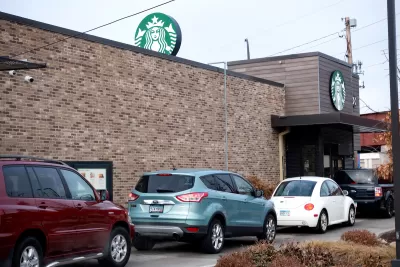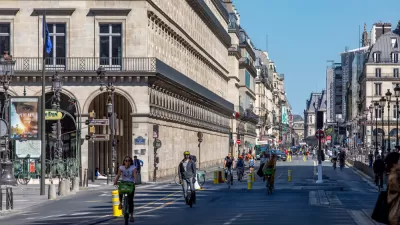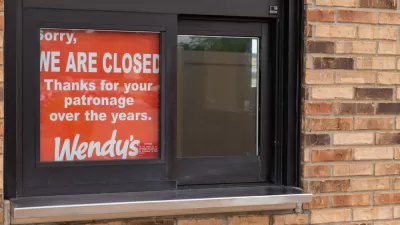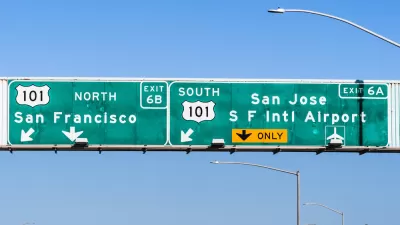Drive-thru fast food restaurants might be a staple of American life, but several U.S. cities are actively considering prohibiting the development of new drive-thrus for the benefit of traffic safety, air quality, and congestion.

Not many U.S. cities have taken the radical step up prohibiting the development of drive-thru operations like fast food restaurants and coffee shops. Minneapolis ended drive-thru development in 2019, but the list of cities prioritizing traffic safety and air quality over driver convenience is relatively small.
Now city planners in Golden, Colorado are considering an ordinance that would limit, or even ban, the development of drive-thrus in the city.
John Aguilar reports in a paywalled article for the Denver Post that Golden has launched what is expected to be a months-long process to explore the potential to limit, or entirely prohibit, drive-thrus in the city.
“Councilman Rob Reed, who with Brown brought the idea forward for consideration, said the detractions of drive-thrus are evident,” reports Aguilar. “They require huge amounts of asphalt, which exacerbates the urban heat island effect common to many paved-over areas. More notably, there’s the impact on air quality, with motorists spewing emissions as they inch forward for that crispy chicken sandwich, bank withdrawal or venti latte.”
Aguilar reports that the changes to drive-thru rules will be considered as part of the city’s ongoing process to revise its zoning code. “Reed said he doesn’t expect Golden to make any decisions on the matter until next spring, at the earliest,” writes Aguilar.
As for the “No-Drive-Thrus Club,” Aguilar also notes that, in addition to Minneapolis, Long Beach in California issued a temporary ban on drive-thrus in 2019 and the Salt lake City Council is expected to vote on its own drive-thru ban for a part of the city in just a few weeks.
FULL STORY: Can there be too many drive-thrus? One Colorado city is considering whether to impose a limit [paywall]

Study: Maui’s Plan to Convert Vacation Rentals to Long-Term Housing Could Cause Nearly $1 Billion Economic Loss
The plan would reduce visitor accommodation by 25,% resulting in 1,900 jobs lost.

North Texas Transit Leaders Tout Benefits of TOD for Growing Region
At a summit focused on transit-oriented development, policymakers discussed how North Texas’ expanded light rail system can serve as a tool for economic growth.

Why Should We Subsidize Public Transportation?
Many public transit agencies face financial stress due to rising costs, declining fare revenue, and declining subsidies. Transit advocates must provide a strong business case for increasing public transit funding.

How to Make US Trains Faster
Changes to boarding platforms and a switch to electric trains could improve U.S. passenger rail service without the added cost of high-speed rail.

Columbia’s Revitalized ‘Loop’ Is a Hub for Local Entrepreneurs
A focus on small businesses is helping a commercial corridor in Columbia, Missouri thrive.

Invasive Insect Threatens Minnesota’s Ash Forests
The Emerald Ash Borer is a rapidly spreading invasive pest threatening Minnesota’s ash trees, and homeowners are encouraged to plant diverse replacement species, avoid moving ash firewood, and monitor for signs of infestation.
Urban Design for Planners 1: Software Tools
This six-course series explores essential urban design concepts using open source software and equips planners with the tools they need to participate fully in the urban design process.
Planning for Universal Design
Learn the tools for implementing Universal Design in planning regulations.
City of Santa Clarita
Ascent Environmental
Institute for Housing and Urban Development Studies (IHS)
City of Grandview
Harvard GSD Executive Education
Toledo-Lucas County Plan Commissions
Salt Lake City
NYU Wagner Graduate School of Public Service





























